- Home
- Elmore Leonard
Charlie Martz and Other Stories: The Unpublished Stories Page 18
Charlie Martz and Other Stories: The Unpublished Stories Read online
Page 18
She stared at him, and at the end of the silence her voice seemed more quiet. “Evan, don’t you ever get tired of being a nice guy?”
“I just don’t think it’s important enough to have to tramp all the way out there.”
He’s afraid: it came to her all at once and in one brief moment seemed to explain everything about Evan. He was really afraid of people—for some reason unnaturally worried about what people thought of him. So he was always friendly, overly friendly. Did that make sense? Thinking about it, she became self-conscious and made her mind see something else. Her father. All right, her father.
Abruptly she said, “I know what Dad would do.”
“I guess he would,” Evan said.
“Well, he doesn’t let people walk all over him!”
“No, you can’t say he does that.”
“If it’s a question of standing up for your rights . . . if it’s something you’ve paid for, something you’re entitled to, why should you care what other people think?”
Evan frowned. “Who are we talking about?”
Don’t go into it now, she thought and said, “Just tell me what you intend to do.”
“I’m going to do the chores, if it’s all right with you.”
That was it. Chris brushed past him; she was down the steps in two strides and walking across the yard. Let him call. Just let him call. She’d keep right on walking and not look back, not even when he came running after her.
But Evan didn’t call. And by the time she had passed the barn she knew he wasn’t going to.
All right, then he’s not, she thought, passing the feedlot now that extended out from the barn. She felt awkward, picturing herself as he would see her from the porch, and she concentrated on maintaining a natural, unhurried stride, her hands deep in the pockets of the loden coat. Just don’t look back, she told herself. Or stumble.
Once through the orchard, following the trace of road that curved into the pasture gate, she felt more sure of herself. She could trip on the deep, frozen ruts and it wouldn’t matter; he couldn’t see her now, not until she reached the high ground of the pasture.
Now you’re worrying about what somebody thinks of you, she thought. Then told herself it was natural; Evan, after all, was her husband. But to be afraid of what everybody thought—to use friendliness as a defense—perhaps being even physically afraid of people, that was something else.
And now you’re stretching it all out of proportion, she told herself. Still, she continued to think of Evan, remembering first the things she liked to remember, seeing him again in a basketball game: tall and long-legged with his relaxed, deft ball-handling and a slow-motion way of going and following through when he took a shot. But after the game they would go out to eat—and there it was.
They could sit in a restaurant for almost an hour waiting to be served or waiting for the check. Evan never complained about the service; and even after sitting there so long, he would still be polite to the waitress and thank her when they left.
Her father’s presence seemed to assure good service. (She couldn’t help thinking of him in contrast to Evan.) He would no more than raise his eyes and a waiter would be at their table. Just as he could pick up a telephone and there would be last-minute good seats for a Detroit Lions football game. Comparing them now, remembering little things about each one, she was more sure than ever that her father was right about Evan.
To Chris, thinking as she moved carefully over the uneven ground, circling the low places that were filled with water and thinly frozen over, the open pasture sloped gradually, almost imperceptibly. Looking up, she was surprised to see the trees so near. They formed a dark, solid expanse between the snow of the pasture and the dull, overcast sky.
Chris stopped at the edge of the trees. Finding whoever was here could be a problem. She hadn’t thought of that before. There was no sound in the trees; no tracks either, she noticed, moving into the dimness. She walked slowly, listening, hearing only her own steps in the dead leaves that almost completely covered the ground.
Evan had mentioned seeing a car. Remembering this, Chris moved in the general direction of the side road that led in from the highway. Less than fifty feet farther on, as she came to a clearing, Chris saw the spot of color, a yellow shape barely visible through the saplings and beyond the wire fence marking their property line. That would be it. Evan had said a yellow convertible.
Nothing to it, Chris thought. Now—
She glanced to the side and stopped. Two men stood watching her from the near end of the clearing: one facing her, a rifle cradled in his arm; the other half turned, looking over his shoulder. Not until he came around did Chris see the whiskey bottle held at his side. He was perhaps nineteen or twenty, bareheaded, with a brush cut that was growing out and needed trimming. He smiled, a thin, vaporous trace of his breath forming in the crisp air.
“Well now—” His gaze seemed dulled, clouded by too much to drink, though he stared at Chris calmly, openly appraising her and obviously liking what he saw.
The man with the rifle was at least thirty: a tall, narrow-shouldered, thin-faced man, his cap cocked on one side of his head and the peak turned up. He nodded to Chris politely, touching his cap with one finger; but with the gesture was the trace of a relaxed, amused smile.
He said, “Can we be of some help to you?”
“Maybe she’s lost,” the younger one said. “Or she come looking for somebody.”
Chris stood still, her hands deep in the pockets of the loden coat. “I’m looking for you if you’ve been doing the shooting.”
“A lot of people shooting,” the one with the rifle said, “during the hunting season.” He spoke slowly, with a relaxed confidence and an unmistakable Deep South drawl.
Just tell them, Chris thought, feeling a sudden irritation. She hesitated, though, and said, almost apologetically, “I’m afraid you’re hunting on private property.”
“Well, you don’t have to be afraid of that,” the one with the rifle said. “Maybe the owner doesn’t mind us hunting his land.”
“If I didn’t make myself clear,” Chris said, quietly, “I’m telling you you’ll have to leave.”
“You’re saying you own those woods?” the younger one asked.
Chris looked at him. “I hope you’re not trying to be funny.”
“I ask a simple question—”
“Of course we own these woods.”
“You say so and that proves it.” The younger one glanced at his friend. “Just take her word for it.”
“I don’t think you’re in a position to question it,” Chris said coldly.
“You don’t, huh—why not?”
“You’re trespassing and you know it.”
He shrugged, shifting his weight to stand hip-cocked, one hand parting the open coat and the thumb hooking into his belt. The other hand still held the whiskey bottle at his side. Noticing it again, Chris saw another rifle leaning against a stump.
“You prove you own this place,” he said, “then we’re trespassing. How’s that?”
“Vince,” the tall one said, swinging his rifle down-pointed under one arm and working his hands into his pockets. “She said we own it.” His eyes remained on Chris. “Who’s we, you and your daddy?”
“My husband and I.”
“He must be off somewhere.”
“He’s at home.”
“Then how come he didn’t come out here himself?”
“What difference does it make whether I tell you or my husband does!” Her voice rose. Chris knew that her face was flushed. She paused. “I think this has gone far enough.”
“Maybe she doesn’t even have a husband.” Vince, the younger one, kept his eyes on Chris. “I mean maybe she’s just saying it . . . you know?”
The other man stood with his narrow shoulders drawn up. He seemed rigid, feeling the cold, though his voice was soft and relaxed. “I wouldn’t put it past her having a husband,” he drawled. “I just don’t picture
him home and her coming out here by herself. I was thinking, maybe she thought it was her husband doing the shooting. She comes out to fetch him and finds us instead.”
“Crazy,” Vince said, grinning. He raised the bottle, studying it in the fading light, then took a long drink, one hand around the neck of the bottle. Lowering it his eyes were on Chris again.
“You want some?”
“No, thank you.”
“I mean it’ll relax you.”
“Look,” Chris said, “either you leave right now or I call the state police.”
Vince shook his head. “I mean she needs relaxin’.”
“I was thinking,” the older one said mildly, “how come if her husband’s home she’d go to all the trouble of calling the police? Why not just get him?”
Vince raised his arms, gesturing lazily. “All the talk. Why don’t we just have a drink?” He extended the bottle toward Chris. “What do we need all the talk for?”
Chris half turned to walk away. “I’m warning you. As soon as I get home, I’m calling the state police. If you’re still here . . . if they arrest you, I promise we’ll make a charge.”
“Vince,” the older one drawled. “What she’s saying is she doesn’t want to drink with you.” He saw Chris moving away. “Wait a minute now.” When she stopped, hesitantly, he moved a few steps toward her.
“You scared of Vince?”
Chris said nothing at first, thinking, Just leave. Quick. But still she waited, watching the older one now. “I don’t think there’s anything more to be said.”
“Don’t mind Vince any,” the older one went on easily. “Hose him off and slick his hair down he’s a pretty clean-cut boy. But”—the man paused, his eyes not leaving Chris—“he’s still just a boy.”
“You skinny hillbilly,” Vince muttered. “I’m all the boy she can handle.”
The older one shrugged, the hint of a smile softening his bony face. “I was thinking though,” he said, “maybe what she’s looking for is a man.” He moved toward her again. “I bet that’s it. A grown man you can appreciate and trust not to tell things.”
You waited too long! Chris knew it, feeling the need to run, to be away from them. She had been uncertain, only sensing a danger at first, feeling the tension inside her growing, warning her. But the gall of them—their posing, play-acting, self-confident gall had been too much, had sparked the irritation, had touched off the outright anger that had compelled her to stand up to them. But now—
She didn’t run. Deliberately she made herself walk, though not hesitating now, or stopping or glancing back when one of them called. His voice came sharply. The younger one. Vince. Or James Dean or whoever he thinks he is. She was aware of this in her mind, in and out of her mind as she pictured them coming after her, as she tried to hear their steps but could hear only the crisp, leaf-sweeping sound of her own boots. She didn’t stop to listen, to make sure, not while she was still in the trees, not even when she had reached the meadow and found herself in the open, feeling the cold wind and the frozen, humped ground beneath her.
She heard the sound of an engine then, a car starting, and she wanted to stop, to make sure they were leaving. But Chris went on, straining to keep up the same long-strided pace, until she reached the high point of the meadow, until she paused, breathing heavily, finally looking back.
One of them stood at the edge of the trees watching her and she knew instantly that it was the older one.
But the car sound—it couldn’t have been anyone else.
The figure at the edge of the trees started across the meadow: a thin, dark shape against a white expanse of snow.
Chris ran the rest of the way—stumbling once while she was still in the meadow, breaking the thin ice of a low place and falling full-length in the shallow water, sobbing as she fumbled with the gate latch, running through the orchard, then in the open again, almost to the yard, and now she screamed, calling Evan, not seeing him on the porch, but screaming his name as she ran across the yard.
Inside the barn, the sound seemed faint, faraway. Evan listened. He stood near the hay bales that were stacked high against the dividing, lengthwise wall of the barn. He wasn’t sure of the sound at first, not until it came again, then there was no doubt what it was or who was calling him.
By the time Evan got to the double doors and pushed out to the cement ramp, Chris was even with the barn—running when he first saw her, but now stopping suddenly, looking toward the house.
“Hey, Chris—”
He saw the car then, the yellow convertible swinging past the corner of the house, cutting sharply and barely missing the back end of the pickup. The car braked, almost coming to a complete stop. Then it was moving again. Moving as Chris whirled and ran for the barn, the car crossing the yard in a straight, deliberate line toward them.
“Evan—” She was on the ramp now, out of breath, reaching for Evan.
“What’s going on? . . . Hey, you’re all wet!” He saw the car swerve to line itself up with the low ramp and Chris was pushing him inside, pulling the heavy door behind them. Abruptly they were in semidarkness and for a moment there was silence, as if the engine sound had been shut off with the daylight.
But it came again, an idling rumble, the guttural, gradual rising sound of dual exhausts. Evan moved instinctively, pulling Chris out of the way, turning with her to shield her as both doors burst open—the near one swinging toward them on its ripped hinges, raking the cement floor with a scraping, splintering shriek before the bottom of the door jammed against the cement. With it was the engine sound a yellow shape hurtling past them. The other door was sheared off cleanly, lifted, and bounced aside as the yellow shape rammed into the hay bales. The engine sound rose and died and the top bales came down on the car, covering the hood and rolling off the canvas top.
The outside light that streaked in now was filled with fine dust. It swirled soundlessly over the car, rising to the peaked ceiling of the barn. Chris stood rigid. She could feel Evan and hear him say something, a whispered, urgent sound close to her, but her gaze was fixed on the car.
Then the whisper again, more clearly. “Chris . . . who is he?”
“They were in the woods, two of them. I told them to leave—” She could see Vince in the car sitting hunched over the steering wheel, his hands close together on it and his head almost touching his arms, not unconscious, for she had seen him move; no, more like he was resting, waiting. Her words ran together as she tried to tell Evan everything at once, quickly, before Vince looked up or got out or did whatever he was going to do.
Evan’s hand moved over her shoulder gently, calming her, and her eyes rose to his face: to the weathered, angular, warm-looking face that she wanted to touch, that showed a small bulge of tobacco as he shifted it from one cheek to the other, staring at the car, studying it with intense interest, yet impassively. He could have been looking at a new tractor, deciding whether or not to buy it.
The decision was made. Chris felt his hand slip away. He started for the convertible and immediately Vince sat up. Vince moved away from the wheel and a rifle barrel came through the open window.
“If you got any ideas—”
Evan walked toward him. “I thought you might need some help.”
“Hold it there!”
“You looked for a minute like you were hurt.”
“You hear me!” The barrel moved, a short, threatening jab, and Evan stopped. He stood five or six feet from the car door.
“I think you better give me the rifle,” Evan said.
“Move again I’ll give it to you.”
Evan frowned. “Are you serious?”
“Try something.”
“You’ve been watching television too much.”
Vince’s eyes shifted to Chris. “Tell her to come up where I can see her.”
“What’ll you do, shoot me if I don’t?”
“I’m telling you one time.”
“You’re absolutely nuts. Do you know that?”
“You get to the count of three,” Vince said.
“Then what?”
“Tell her!” He screamed it, jabbing the rifle again.
Evan glanced over his shoulder at Chris. “You want to hand over the rifle, Vince? Then we’ll talk about what you’re going to do about my doors.”
Vince stared, his pose showing no more expression than if he were asleep with his eyes open. “I’m going to teach you a lesson, man.” He barely moved his mouth saying it, yet the words came out clearly.
Evan stared back at him. “Sitting in the car?”
“I’m coming out.”
“Today?”
Vince pulled himself toward the door, the rifle barrel coming out farther. “You just keep asking for it, don’t you?”
“And you keep sitting there,” Evan said mildly.
The door latch clicked free. Evan waited. He waited until the door started to open, until the rifle barrel angled away and he saw one of Vince’s feet beneath the door, Vince stooped and momentarily off balance, just beginning to straighten up—
Evan moved then, pivoting as he lunged, and threw his hip solidly against the car door, slamming it into Vince’s legs and stomach. The door swung open as Evan bounced off and now he let it come, stepping in and around it, hooking his fists into Vince’s body, hitting him twice, then a third time, before Vince could cover himself and turn away. Evan pulled the rifle out of his hand, stepping back with it, and Vince slumped against the car door as a boxer hangs on the ropes of a prize ring.
From where she was standing, Chris saw only Evan’s back and the barrel of the rifle almost touching the ground at his side. She heard him say something to Vince, not the words, only the sound of his voice that seemed softer, more gentle, now that it was over and she was aware of the dimness again and the hay dust still hanging in the shaft of light.
But the other one, Chris thought.
And that suddenly she knew it wasn’t over, that this was no more than a lull, a moment’s rest that ended abruptly as her gaze moved from Evan and she saw the other man in the doorway, his tall, hunch-shouldered frame sharply silhouetted in the outside light.

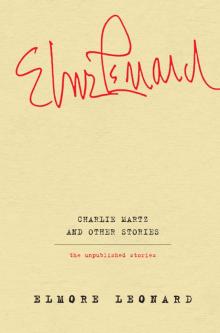 Charlie Martz and Other Stories: The Unpublished Stories
Charlie Martz and Other Stories: The Unpublished Stories Elmore Leonard's Western Roundup #2
Elmore Leonard's Western Roundup #2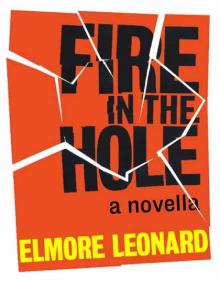 Fire in the Hole
Fire in the Hole Tishomingo Blues (2002)
Tishomingo Blues (2002)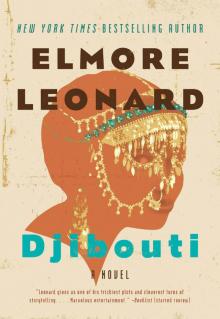 Djibouti
Djibouti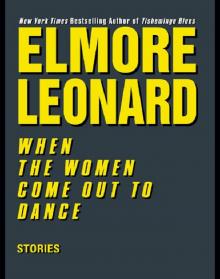 When the Women Come Out to Dance: Stories
When the Women Come Out to Dance: Stories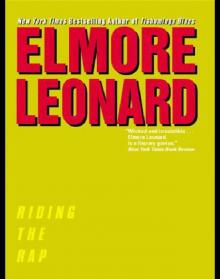 Riding the Rap
Riding the Rap Moment of Vengeance and Other Stories
Moment of Vengeance and Other Stories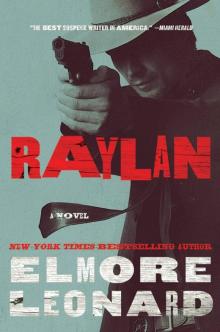 Raylan
Raylan Touch
Touch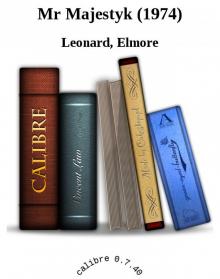 Mr Majestyk
Mr Majestyk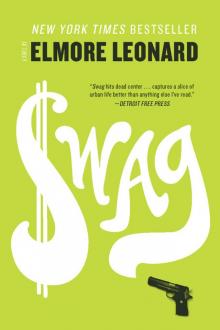 Swag
Swag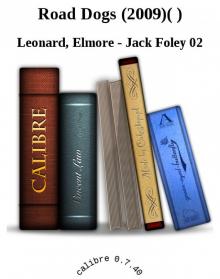 Road Dogs
Road Dogs La Brava
La Brava The Hot Kid
The Hot Kid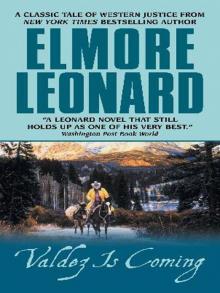 Valdez Is Coming: A Novel
Valdez Is Coming: A Novel Be Cool
Be Cool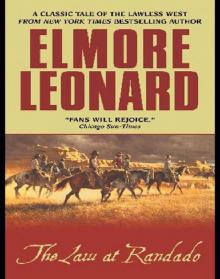 The Law at Randado
The Law at Randado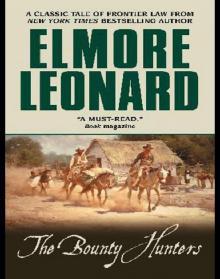 The Bounty Hunters
The Bounty Hunters When the Women Come Out to Dance
When the Women Come Out to Dance 310 to Yuma and Other Stories (1953)
310 to Yuma and Other Stories (1953)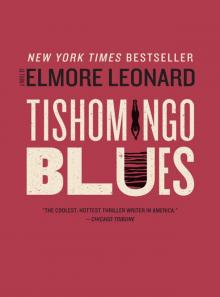 Tishomingo Blues
Tishomingo Blues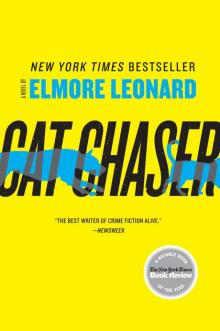 Cat Chaser
Cat Chaser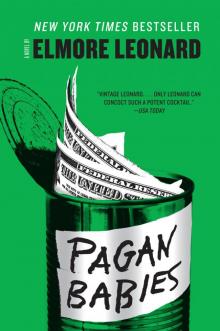 Pagan Babies
Pagan Babies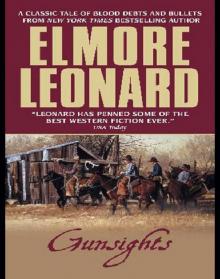 Elmore Leonard's Western Roundup #1
Elmore Leonard's Western Roundup #1 52 Pickup
52 Pickup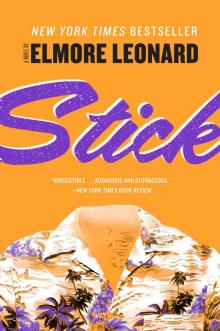 Stick
Stick The Moonshine War
The Moonshine War Valdez Is Coming
Valdez Is Coming City Primeval
City Primeval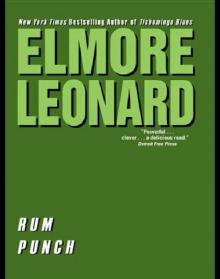 Rum Punch
Rum Punch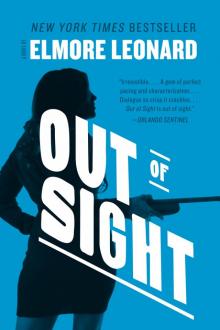 Out of Sight
Out of Sight Naked Came the Manatee (1996)
Naked Came the Manatee (1996)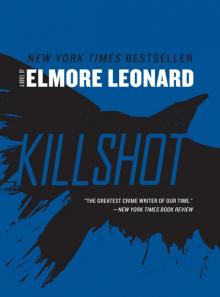 Killshot
Killshot Cuba Libre
Cuba Libre Forty Lashes Less One
Forty Lashes Less One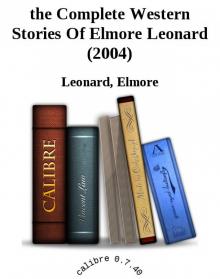 The Complete Western Stories of Elmore Leonard
The Complete Western Stories of Elmore Leonard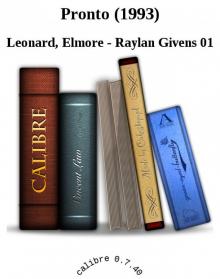 Pronto
Pronto Split Images
Split Images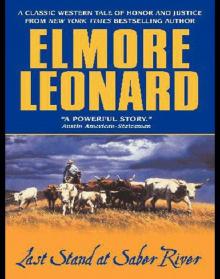 Last Stand at Saber River
Last Stand at Saber River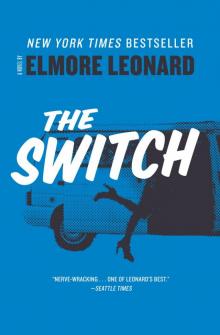 The Switch
The Switch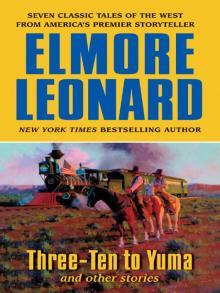 Three-Ten to Yuma and Other Stories
Three-Ten to Yuma and Other Stories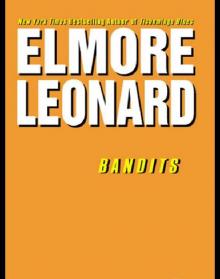 Bandits
Bandits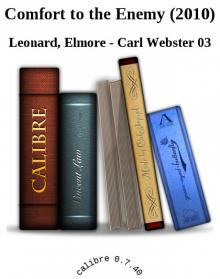 Comfort to the Enemy and Other Carl Webster Stories
Comfort to the Enemy and Other Carl Webster Stories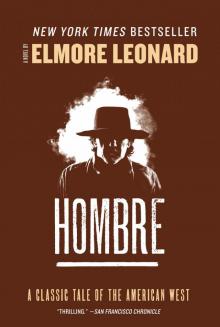 Hombre
Hombre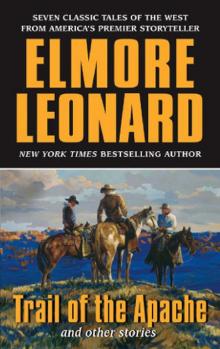 Trail of the Apache and Other Stories
Trail of the Apache and Other Stories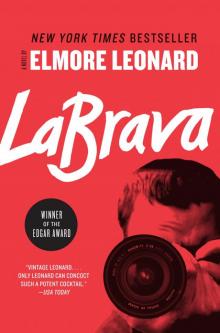 LaBrava
LaBrava Gold Coast
Gold Coast Jackie Brown
Jackie Brown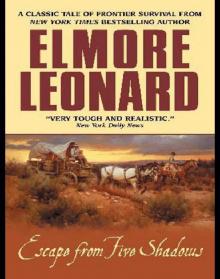 Escape From Five Shadows
Escape From Five Shadows Karen Makes out (1996)
Karen Makes out (1996)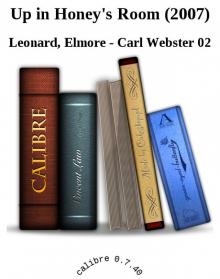 Up in Honey's Room
Up in Honey's Room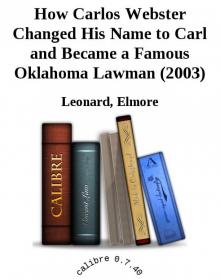 How Carlos Webster Changed His Name to Carl and Became a Famous Oklahoma Lawman (2003)
How Carlos Webster Changed His Name to Carl and Became a Famous Oklahoma Lawman (2003)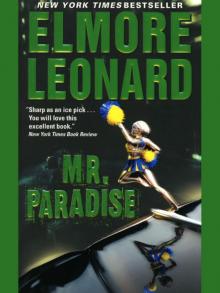 Mr. Paradise
Mr. Paradise The Hunted
The Hunted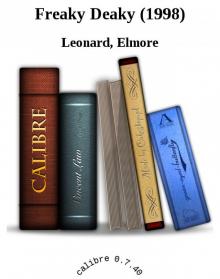 Freaky Deaky
Freaky Deaky Louly and Pretty Boy (Ss)
Louly and Pretty Boy (Ss)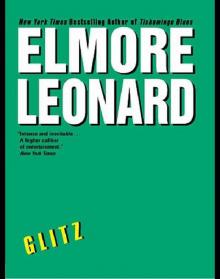 Glitz
Glitz A Coyote's in the House
A Coyote's in the House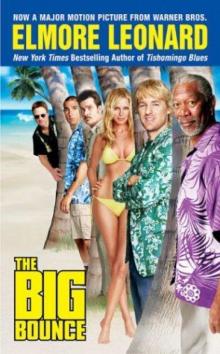 The Big Bounce jr-1
The Big Bounce jr-1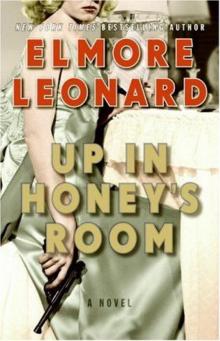 Up in Honey's Room cw-2
Up in Honey's Room cw-2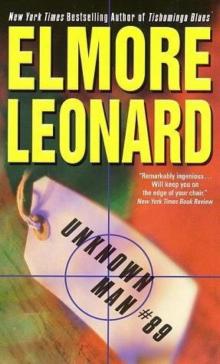 Unknown Man #89 jr-3
Unknown Man #89 jr-3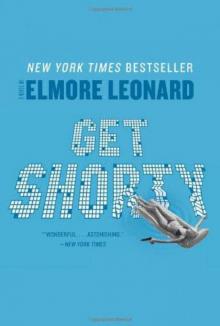 Get Shorty: A Novel cp-1
Get Shorty: A Novel cp-1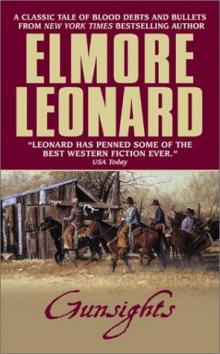 Gunsights
Gunsights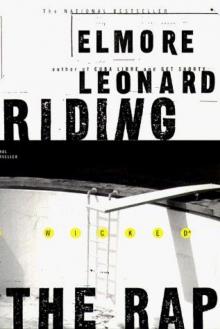 Riding the Rap rg-2
Riding the Rap rg-2